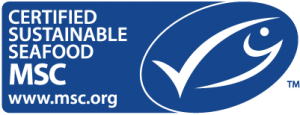
When you see the MSC blue fish label on packaging, it means that seafood product is wild caught, sustainably sourced, and verified by MSC’s high standards. The MSC certification process is based on science. Fisheries achieve certification only after a rigorous assessment performed by a third party. Even after being certified fisheries must maintain best practices to retain certification. Through this process the fisheries that are MSC certified are often found at the forefront of global innovations and principles.
Three main principles are considered when fisheries are independently assessed for sustainability. It is a science based method to see if they meet the high standards set forth by the certifying body.
Sustainable Fish Stocks: Are enough fish left in the ocean? Fishing must be at a level that ensures it can continue indefinitely and the fish population can remain productive and healthy. The stocks are fished in a way that does not threaten the population’s long-term health and minimizes the damaging effects of fishing to the surrounding wildlife and ecosystem.
Minimizing Environmental Impact: What are the impacts? Fishing activity must be managed carefully so that other species and habitats within the ecosystem remain healthy. Wild Caught seafood comes from the ocean, lakes, or rivers teeming with wild populations. The health of these environments is integral to securing seafood for future generations.
Effective Fisheries Management: Are operations well managed? MSC certified fisheries must comply with relevant laws and be able to adapt to changing environmental circumstances. And once certified, fisheries are regularly assessed in order to keep their certification.
When you see fish or seafood products with the MSC blue fish label, you can be sure they come from a sustainable fishery that has met the MSC Fisheries Standard. Business trading in these products have met the MSC Chain of Custody Standard for traceability.
visit msc.org for more detailed information.
Ducktrap MSC certified products are processed in the Belfast, Maine facility using raw material from the U.S. Maine MSC- C 55501